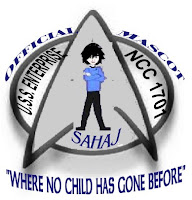What Exactly Is Editing
Part VIII
Non-human Words
Previous parts of the series on what Editing is and why it is done at all, why Editors seem to be (but aren't) "gatekeepers" preventing good writing from being published, and how to deal with an Editor doing the editor's job are indexed here:
https://aliendjinnromances.blogspot.com/2019/02/index-to-what-exactly-is-editing-by.html
This entry is about a choice that Indy Writers, self-publishers, or small ebook publishers have to make, and why they make it.
How do you present speech from a non-human language?
Leah Charifson started a discussion on this age-old point on the Sahaj Group on Facebook in 2018.
https://www.facebook.com/groups/996258333717617/
I've discussed the Star Trek fanzine series, SAHAJ which was created by Leah under the pen name Leslye Lilker many years ago, and has been a favorite of generations of readers.
https://aliendjinnromances.blogspot.com/2015/12/guest-post-star-trek-fan-fiction-writer.html
https://aliendjinnromances.blogspot.com/2017/12/reviews-35-best-seller-vs-best-read-by.html
https://aliendjinnromances.blogspot.com/2017/12/guest-post-by-leslye-lilker-being.html
https://aliendjinnromances.blogspot.com/2017/12/finding-story-opening-part-3-should-pro.html
Sahaj is the son of Spock and a Vulcan Ambassador with ulterior motives who eventually gets a very Vulcan comeuppance -- and now the Series is following Sahaj into adulthood.
The scenes of the newer work take place across planets and deep inside Vulcan -- and Spock's ancestral home. Many Vulcan (and other alien languages) words have to be casually incorporated into the stories.
To make the narrative flow, a writer often has to choose whether this "word" is to be italicized, or not. The choice when writing under contract for a publishing house, is often not the writer's to make, so even professional writers with many Mass Market novels on the shelves, ponder this knotty question in depth.
The general rule for writing in English is to italicize foreign words (French, Spanish, German, etc.). This is a pretty firm grammatical rule of ancient times (like before Microsoft Word).
But times are changing.
Decades ago, I decided (while writing Sime~Gen(R) Novels [yes, Sime~Gen is a REGISTERED TRADEMARK]) that I was writing my novels not in English but in Simelan -- and so the few Simelan words that couldn't translate into English (for readers) were in plain text, but capitalized when appropriating an English word to describe a Sime (mutant human) experience.
 |
| https://www.amazon.com/Sime-Gen-14-Book-Series/dp/B01N4SG08Q/ |
One such example is the word, Kill. When used as a verb, it generally just means what it would mean in any English sentence. But when referencing the special meaning, unique to Simes, it is capitalized - but not italics. Italics could then be added to the Kill word for emphasize or worded-thoughts not spoken aloud.
The vocabulary list grew, and is still growing as new novels in the Sime~Gen Series are published.
Here is a short list with spoken audio files
http://www.simegen.com/background/soundfiles.html
Once readers "acquired" (as a baby learns speech) the Simelan word from context and usage, fans started using them in daily speech, baffling some but getting away with invective that just would not be acceptable in mixed company.
So in effect the non-italicized words became English "borrowings" -- which is how French words have become just plain English.
Because we now have word processors and desktop publishers with many fancy fonts -- and generally, even mass market books are not hand-typeset any more, but made from the electronic files, we are free to go WILD with all the fancy and illegible fonts we can acquire.
Here's the big problem -- long known by the biggest publishers.
READERS DO NOT LIKE DISTRACTING FONTS
Currently, Jean Lorrah, Mary Lou Mendum, and I are re-writing three of Mary Lou's Sime~Gen fanzine novels about her characters, Den and Rital, for professional publication as part of the Series main historical line. Comparing her original fanzine stories to the final professional product should give many fanzine writers a good idea of how to sell fannish writer to the wider market.
Here is Book One in her Sime~Gen Trilogy:
Mary Lou's fanzine novels used (and we tried to preserve and re-create) many fancy fonts to illustrate slogans painted on signs carried by protestors.
Wildside Press nixed the fancy fonts -- not because their publisher program lacks them, but because readers in general don't like them. Wildside is run by people who have decades experience in Manhattan Publishing. Despite the fact that Sime~Gen fans (who already love the published novels) love the fancy fonts in Mary Lou's fanfic, Wildside decreed no fancy fonts -- maybe BOLD or ALL CAPS, but all the same font-face.
So with my few examples of how a page looks with the limited number of fonts Blogger allows all scrambled together -- you should "see" the publisher's point.
Now this is a decision specific to Sime~Gen -- which has lots and lots of italicized words, worded thoughts, and titles, and other unavoidable protocols. But in general, it is still the rule that readers don't want the eye distracted.
So, we are still using the Capitalization of English Words that have been redefined to designate Simelan vocabulary.
From a writer's perspective, either method is arduous. The proofing is nightmarish. So the best choice is "less is more" -- use as little italics or even capitalization as possible, just enough to evoke the alien speech rhythm and different way of thinking.
If the choice is up to you, and not a style-sheet from your publisher, italicize worded thoughts, ship names, dream passages, and try to evoke alien thinking without making up unpronounceable words. The fewer Alien Language words you use, the more striking, memorable and evocative they will be. Use Alien only where there is no English equivalent.
Jacqueline Lichtenberg
http://jacquelinelichtenberg.com






































No comments:
Post a Comment